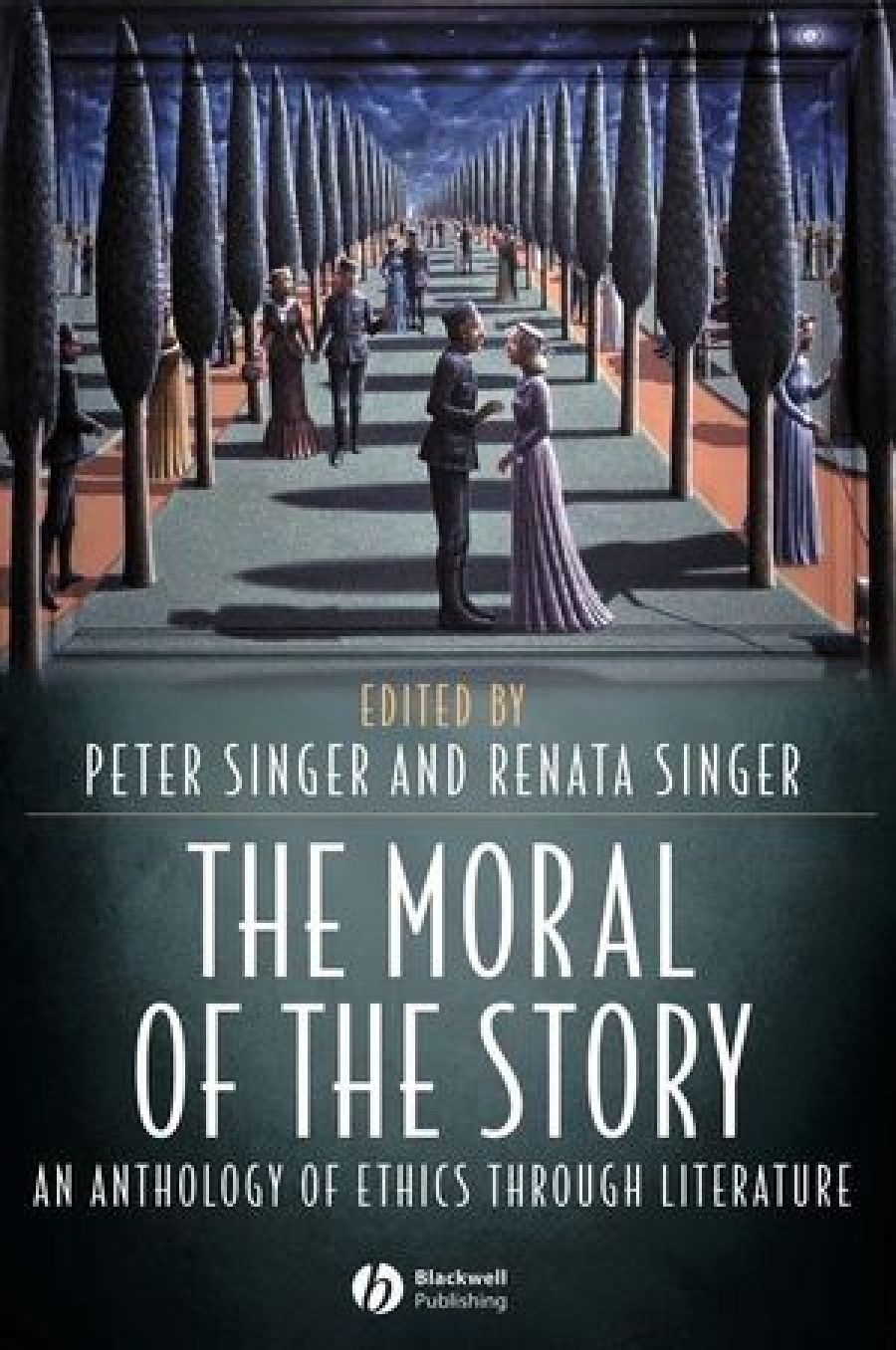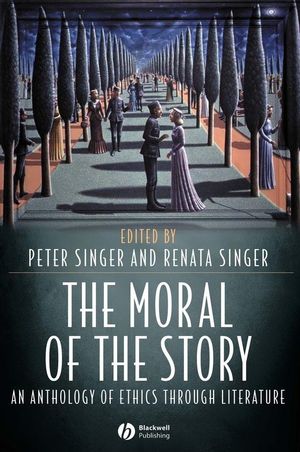
- Free Article: No
- Contents Category: Literary Studies
- Review Article: Yes
- Article Title: Richard Freadman reviews ‘The Moral of the Story: An anthology of ethics through literature’ edited by Peter Singer and Renata Singer
- Online Only: No
- Custom Highlight Text: Literature is rich in ethical implication, but do we incur ethical responsibilities when we write about it? Arguably we do. Literary authors seek to convey something to others, and to convey it in literary form. Perhaps, then, our accounts of literature should respect its literary qualities, not least when we bring literature into interdisciplinary contact with other discourses?
- Book 1 Title: The Moral of the Story
- Book 1 Subtitle: An anthology of ethics through literature
- Book 1 Biblio: Blackwell, $49.95 pb, 621 pp
- Book 1 Cover Small (400 x 600):

- Book 1 Cover (800 x 1200):

F.R. Leavis, the best-known recent exponent of ethically oriented literary criticism, rejected what he saw as reductive applications of philosophical ethics to literature. Literature, he thought, could do its own characteristically literary thinking. Leavis could be petulantly proprietorial about literature, but on literature and ethics he had a point. There are many varieties of literature and many sorts of philosophy, but literary explorations of ethics tend to work through patterns of emotional identification that seldom occur in philosophy. (Plato is a notable example.) Philosophy generally seeks conceptual clarification, the elimination of ambiguity and contradiction; major works of literature, by contrast, often perceive and dramatise ambiguity and contradiction as irreducible aspects of the world. Despite Leavis’s influential objections, and challenges from contemporary literary theory, a good deal of sophisticated ethically oriented literary criticism has appeared in recent decades, some of it by analytic philosophers who have participated in philosophy’s ‘narrative turn’: Martha Nussbaum, Stanley Cavell, Iris Murdoch and others. But humanist literary critics have also played an important part. America’s finest exemplar was perhaps Lionel Trilling; in Australia, where excellent work has been done in the field, the doyen was S.L. Goldberg.
Even for those who remain committed to humanist approaches to relations between literature and ethics, postmodern literary theory has compelled some serious rethinking. Theory has shown that ‘Literature’ is a more provisional and shifting designation than many had thought; that genre distinctions can be problematic and prone to ideological motivation. While often committed to moral projects – gender, race, class and other emancipatory movements – postmodern theory has attacked some of the foundational assumptions of ethical literary humanism: the existence of a discerning and highly individuated self-as-moral-agent; language’s capacity faithfully to communicate significant aspects of reality, including complex ethical situations and discourses; and the image of the author as, potentially at least, a creative moral agent whose texts bespeak that agency. Debates continue. Some proponents of contemporary theory find in Jacques Derrida’s work, for instance, new and more responsible ways of treating relations between ethics and literature; others worry that the politicisation of literature in some recent criticism and theory recommits old reductionist mistakes.
Interdisciplinary treatments of philosophy and literature need to take concerted account of these debates. Renata and Peter Singer’s The Moral of the Story is addressed to ‘students taking courses both in ethics and in literature’ and ‘readers, whether or not they are students in the formal sense, like reading good literature and have an interest in the issues with which this book deals’. This seems to flag an even-handed interdisciplinary project in which the two constituent discourses – literature and ethics – will enter into a conversation between equals. But the book’s title does not bode well: The Moral of the Story seems to repeat the oldest of the reductionist errors: the mining of literature for paraphrase-able moral lessons. Nor does the subtitle – An Anthology of Ethics through Literature – seem reassuring. What is the force of ‘through’?
The authors begin by noting that ‘philosophical examples in ethics usually lack depth’. By contrast, ‘discussions of ethical views in fiction tend to be concrete, rather than abstract, and to give a rich context for the distinctive moral views or choices that are portrayed’. Literature, then, brings its own dimensions and nuances to ethical representation; but the notion of ‘context’ here seems rather limited: it appears to entail a more elaborate situational backdrop for, and richer evocations of, moral conduct than philosophical ethicists generally provide. But does it also encompass the specifically ‘literary’ ways in which literature can deepen our understanding of moral situations and ethical issues? Despite occasional signals to the contrary, The Moral of the Story does not supply this important requirement. It simply reads literature as a storehouse of examples for the exploration, elucidation, sometimes even pontification about topics in philosophical ethics: issues pertaining to personal identity; duties to kin; love, marriage and sex; abortion, euthanasia and suicide; work; conduct towards our country, compatriots and strangers; racism and sexism; ethics and politics; war; animals and the environment; duties to god; new life forms; the nature of ethics; rules, rights, duties and the greater good; and ultimate values.
All of these are, of course, critically important topics, and it is pleasing to see a major philosophical ethicist and an accomplished novelist reasserting literature’s ethical powers. The anthology is lovingly assembled and contains many excerpts that demand inclusion, along with some welcomely unexpected ones. One can always quibble about matters of selection and balance – this anthology, for instance, arguably underrepresents the sort of postmodern literary text that submits the very notion of authoritative ethical discernment to radically sceptical scrutiny – but few who purchase this volume will regret having such a splendid gathering of ethically engaged literature on their shelves.
Setting the book as a required text for university literature and ethics courses is another matter. Its expository apparatus comprises introductory essays to each thematic section, and text specific discussions that come after the anthologised excerpts. It has to be said that these seldom engage with literature qua literature. The excerpts are pressed into the service of often reductive ethical elucidation and question-framing. One example: the famous ‘requirements of their imagination’ scene in Henry James’s The Portrait of a Lady is included under a thematic section entitled ‘Ultimate Values’. According to the introductory essay, the excerpt – in which Ralph Touchett urges his father to divert half of his patrimonial bequest to Isabel Archer – expresses ‘some sympathy for the tastes and values of an élite, rather than for relieving the suffering and hardship of ordinary people’. The subsequent gloss on the excerpt asks questions such as: ‘Are Ralph’s ultimate values’ – for instance, his inattention to the poor – ‘defensible’. These are real ethical issues, but they are not what James is on about, and the discussion overlooks the ‘literary’ complexities of the passage: Ralph’s disturbingly ambivalent tone, the sinister resonances of key thematic nouns like ‘interest’ and ‘amusement’, the shift from the apparent altruism of ‘their imagination’ to Ralph’s concluding ‘my imagination’.
‘Through’, then, does betoken a reduction of literature to ethics. In one respect, this does not undermine the book’s apposite range and expertise as a tool for ethical pedagogy; but in another, it does: oughtn’t even university students of philosophical ethics be exposed to literature’s special powers of heuristic moral enquiry? Shouldn’t students in each discipline – bearing in mind that many will take subjects both in literature and philosophy – be introduced to the complexities of interdisciplinary inquiry? Even the reading list at the book’s end is heavily weighted towards philosophy.
Just occasionally, reference is made to the impact of contemporary literary theory, as in the following remark about postmodern theory and cultural relativism: ‘the rise of postmodernist thinking, with its critique of the universalist ideas of the Enlightenment, has made relativism more popular among students of literary theory and culture, who are often unaware of how uncongenial and paradoxical the implications of relativism really are.’ I for one agree with the substance of this, but the slightly superior tone of dismissal gives little hint of how deep and complex recent debates about cultural relativism in literary and cultural studies have been. Tone, indeed, is an issue in this book: though admirably clear, its discussions can seem ponderously self-evident (‘But in politics strict adherence to this principle [the ends not justifying the means] can be a guarantee of ineffectiveness’) and best suited to a VCE readership.
This well-intentioned book by lovers of literature has the unfortunate effect of simplifying literature and casting it as something of a philosophical convenience. A useful introduction to philosophical ethics, it fails adequately to honour the ‘requirements’ of the ‘imagination’.


Comments powered by CComment